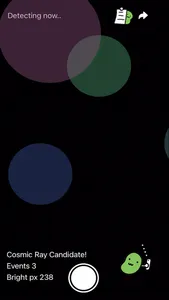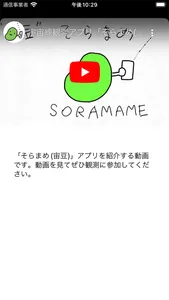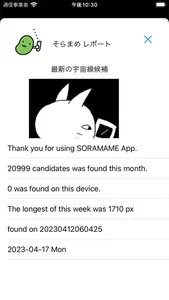This is an app developed in collaboration with Kanagawa University (Faculty of Engineering in field of applied physics, Hibino Laboratory) to achieve scientific research and science education goals by observing cosmic rays. Cosmic rays are high-energy particles that come from within our galaxy or from outside of it and enter Earth's atmosphere, creating large amounts of secondary particles through reactions with atmospheric nuclei. The goal of this app is to capture these secondary particles using the camera sensor of a smartphone. On average, secondary particles from cosmic rays rain down on Earth at a frequency of about one particle per minute per square centimeter, and they penetrate not only our bodies but also materials like stones and concrete. When these particles pass through a camera sensor made of silicon, they leave a faint trace resembling a scratch. This app searches for these traces in digital images taken in complete darkness, with visible light blocked out. LivePhoto function is used, and it is recommended to use a device that is not typically used.
If a candidate for cosmic rays is confirmed, the corresponding 100x100 pixel area in the dark digital image, along with device ID, location information, device orientation, noise level, and date, will be sent to the data server. None of this information is linked to personal information. When enough data is obtained, the analysis results will be publicly available on the website. Scientifically meaningful results may also be presented at domestic and international conferences. To use this app, install it and place the device in a dark place or cover the rear camera with black tape or similar material to block out light. Place the device in vertical(lansccape)position, then, press the shutter button and wait. To stop, tap the shutter button again. If the light-blocking is insufficient, a notification will appear. Tapping the star icon in the upper right corner allows you to check the number of cosmic ray candidates captured. Please keep the power adapter connected as the power consumption is high.
The latest images of cosmic ray candidates and analysis results will be published on this page.
https://soramame.n.kanagawa-u.ac.jp/en/
If a candidate for cosmic rays is confirmed, the corresponding 100x100 pixel area in the dark digital image, along with device ID, location information, device orientation, noise level, and date, will be sent to the data server. None of this information is linked to personal information. When enough data is obtained, the analysis results will be publicly available on the website. Scientifically meaningful results may also be presented at domestic and international conferences. To use this app, install it and place the device in a dark place or cover the rear camera with black tape or similar material to block out light. Place the device in vertical(lansccape)position, then, press the shutter button and wait. To stop, tap the shutter button again. If the light-blocking is insufficient, a notification will appear. Tapping the star icon in the upper right corner allows you to check the number of cosmic ray candidates captured. Please keep the power adapter connected as the power consumption is high.
The latest images of cosmic ray candidates and analysis results will be published on this page.
https://soramame.n.kanagawa-u.ac.jp/en/
Show More


